Visiting scholars discuss “Kurdish Question”
Visiting professors Amir Sharifi and Asli Ü Bâli discussed the relationship between the Turkish state and its Kurdish minority population at the Annenberg School for Communication on Thursday evening.

Adriana Shen | Daily Trojan
An ongoing conflict · Amir Sharifi, director of the Kurdish Human Rights Advocacy Group, spoke on the need for changes at the local level in Turkey.
The discussion, hosted by the USC Middle East Studies Program and moderated by Evîn Cheikosman, a M.A. candidate in the USC Center on Public Diplomacy, was an opportunity for the crowd in attendance to reinforce their knowledge on the complicated social and political relationships between the Turkish state and Kurds, from their first butting of heads after World War I to today.
Sharifi is the director of the Kurdish Human Rights Advocacy Group, president of the Kurdish American Education Society and lecturer of linguistics at California State University, Long Beach. Bâli is a professor of law at the UCLA School of Law who teaches public international law, international human rights and a seminar on the laws of war.
The Kurdish people are an ethnic group from the Mesopotamian Plains, an area that encompasses parts of many Middle-Eastern nations, such as south-eastern Turkey, north-eastern Syria, northern Iraq, north-western Iran and south-western Armenia.
Despite their dispersal between these nations, the Kurds share a common language and culture that transcends man-made borders. This has led many Kurds, beginning in the 20th century, to advocate for the establishment of an independent Kurdish state, putting them at direct odds with the newly formed Turkish state after World War I.
“At the founding of the Turkish state, there was absolutely no recognition of such a thing as a Kurdish community,” Bâli said. “In fact to this day you will hear Turkish nationalists recite the same narrative that was present at that time at the founding that there is no such thing as a Kurdish population, there is only Mountain Kurds, [a derogatory term].”
Today, Kurds make up 20 percent of Turkey’s population, but despite this, only just managed to gain any sort of representation in the government in the form of the People’s Democratic Party (HDP), a left-wing, progressive and pro-Kurdish party. However, this movement has taken a step back following the recent coup attempt in Turkey this past July.
“You see the Turkish government opportunistically using the purges to simply lump in anybody who is politically aligned with a pro-Kurdish position,” Bâli said. “Most recently and most prominently, of course, with the removal of 24 elected mayors in the Southeastern provinces of Turkey from their office and their detainship [sic] and prosecution, allegedly as part of some sort of terrorist conspiracy.”
Sharifi, himself a diasporic Kurd from Iran, believes that while Kurds in areas like Turkey have a long way to go before they are free of persecution and that changes needs to occur in local municipalities, rather than broad sweeping change at the national level.
“Democracy is to be institutionalized, if you mention I think, for instance in Turkey, the HDP played such a significant role through the municipalities,” Shafri said. “And I think this is something historic about the Kurds. Through these communal formations of political and civil representations, they can primarily have a popular participatory mechanism whereby they would be exercising their right to self-assertion and right to self-determination.”
Despite the long-held animosity between Turkey and its Kurdish citizens, Bâli believes that there is hope for a progressive future in Turkey that fosters greater cooperation between the two groups.
“An interesting phenomenon that we’ve seen over the last decade is the emergence of a Kurdish voice in Turkey that isn’t just a voice about ethnic identitarian concerns, but about a political formation,” Bâli said. “[It is] a progressive platform that encompasses many more things — LGBT communities, gender equality, environmental protections — [which] many Turks … disgusted with the mainstream existing political formations might be prepared to sign up for.”
